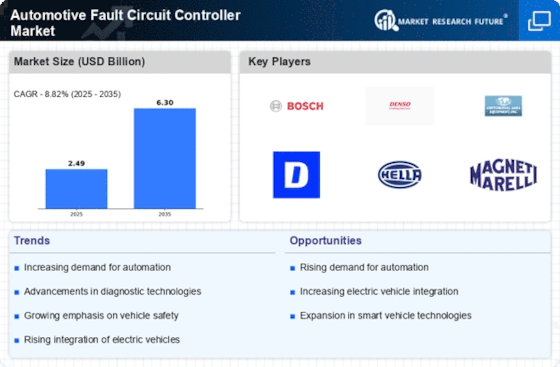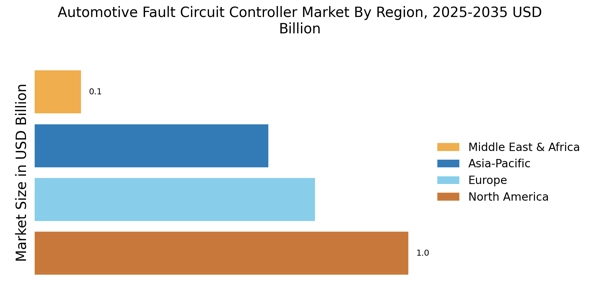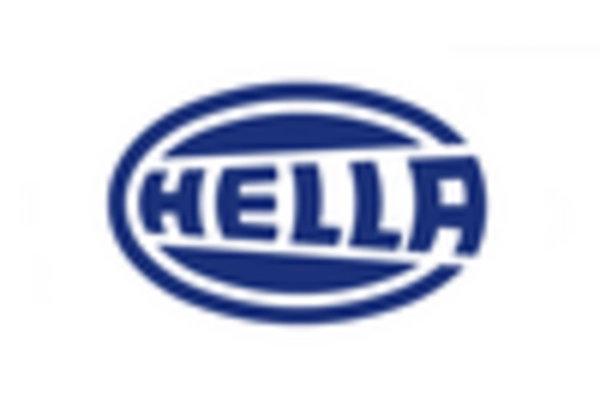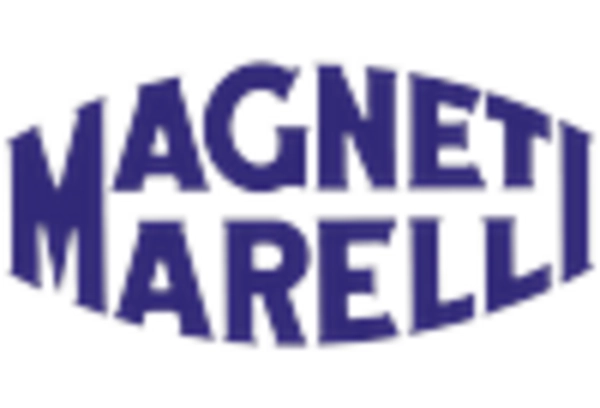Growth of Electric and Hybrid Vehicles
The growth of electric and hybrid vehicles is a pivotal driver for the Automotive Fault Circuit Controller Market. As the automotive landscape shifts towards electrification, the complexity of electrical systems in these vehicles increases. Fault circuit controllers are essential for managing the intricate electrical networks found in electric and hybrid vehicles, ensuring optimal performance and safety. The electric vehicle market is projected to expand at a compound annual growth rate of over 20% in the coming years. This rapid growth presents a substantial opportunity for the Automotive Fault Circuit Controller Market, as manufacturers seek reliable solutions to address the unique challenges posed by electric powertrains.
Rising Demand for Vehicle Safety Features
The Automotive Fault Circuit Controller Market is experiencing a notable surge in demand for enhanced vehicle safety features. As consumers become increasingly aware of safety standards, manufacturers are compelled to integrate advanced fault detection systems into their vehicles. This trend is driven by the need to minimize accidents and ensure passenger safety. According to recent data, the automotive safety market is projected to grow significantly, with a compound annual growth rate of approximately 8% over the next five years. This growth is likely to propel the Automotive Fault Circuit Controller Market, as these controllers play a crucial role in monitoring and managing electrical faults, thereby enhancing overall vehicle safety.
Technological Advancements in Automotive Electronics
Technological advancements in automotive electronics are significantly influencing the Automotive Fault Circuit Controller Market. Innovations such as the Internet of Things (IoT) and artificial intelligence (AI) are being integrated into vehicle systems, allowing for real-time monitoring and diagnostics. These advancements enable fault circuit controllers to detect issues more efficiently, reducing downtime and maintenance costs. The market for automotive electronics is expected to reach USD 300 billion by 2026, indicating a robust growth trajectory. As these technologies evolve, the Automotive Fault Circuit Controller Market is likely to benefit from increased adoption of smart vehicle systems that require sophisticated fault management solutions.
Consumer Preference for Advanced Vehicle Technologies
Consumer preference for advanced vehicle technologies is a significant factor influencing the Automotive Fault Circuit Controller Market. As consumers increasingly seek vehicles equipped with cutting-edge technologies, manufacturers are compelled to integrate sophisticated fault management systems. This trend is evident in the rising popularity of features such as automated driving assistance and enhanced connectivity. Market Research Future indicates that nearly 60% of consumers prioritize advanced technology in their vehicle purchasing decisions. Consequently, the Automotive Fault Circuit Controller Market is likely to experience growth as manufacturers respond to this demand by incorporating advanced fault circuit controllers that enhance vehicle functionality and reliability.
Increasing Regulatory Standards for Automotive Safety
Increasing regulatory standards for automotive safety are shaping the Automotive Fault Circuit Controller Market. Governments worldwide are implementing stricter regulations to enhance vehicle safety and reduce accidents. These regulations often mandate the inclusion of advanced fault detection systems in new vehicles, thereby driving demand for fault circuit controllers. For instance, the European Union has introduced regulations that require all new vehicles to be equipped with advanced safety features by 2025. This regulatory landscape is likely to create a favorable environment for the Automotive Fault Circuit Controller Market, as manufacturers strive to comply with these standards while ensuring the safety of their vehicles.

















